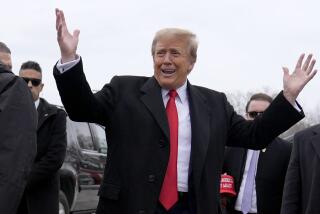Archibald Crossley, Early Pollster, Dies
- Share via
Archibald M. Crossley, who with friendly rival George Gallup began a series of opinion polls in the 1920s that developed into a national fascination with prophecy, is dead.
Crossley was 88 when he died Wednesday at his home in Princeton, N.J.
He began his career as a radio pollster after an advertiser became concerned that paid messages were not being aired. Crossley began making selected checks of radio listeners across the land, and from that he developed the demographics that are still used by pollsters today.
Crossley preceded Gallup in the public opinion business by several years. Gallup, who died last July, didn’t begin asking questions for a living until 1935, nine years after Crossley started.
Predicted Roosevelt Win
With Gallup and another pollster pioneer, Elmo Roper, Crossley correctly predicted that Franklin D. Roosevelt would defeat Alfred Landon in the presidential election of 1936. This was the first presidential sampling based on scientifically selected portions of the populace and came as the Literary Digest was forecasting a Landon victory. The magazine, which soon went out of business, had based its poll responses from automobile owners and telephone subscribers.
Also with Gallup, Crossley forecast that Thomas E. Dewey would defeat Harry S. Truman in 1948. It was after that famous fiasco that pollsters began limiting their efforts to predicting trends rather than results. That prediction also led to pollsters stating when a survey had been conducted and what margin of error might be involved in a particular poll.
Crossley, who was believed to have coined the word “ratings,” was the first to become involved with the psychology of his questionnaires--how they were worded and the intensity of response they drew.
In 1967, after a private Crossley poll commissioned by friends of Lyndon B. Johnson was leaked to the press in an attempt to bolster the President’s sagging popularity, Crossley crusaded for stricter ethics in the polling profession and established fastidious professional criteria for his poll takers.
(The 1967 poll showed Johnson far ahead of selected rivals for the 1968 election. But in many states it omitted key potential Republican candidates from the questionnaire.)
Attended Princeton
Crossley attended Princeton University in 1917 and started his career the following year with a small advertising agency in Philadelphia.
He founded his research organization, Crossley Inc., in 1926. The company operated until 1954, when it merged with another survey firm to become Crossley Surveys, which still operates.
Crossley and Gallup founded the National Council on Public Polls. Crossley also began the Market Research Council and the American Assn. for Public Opinion Research.
On the 50th anniversary of his poll taking, Crossley expressed dismay over modern polling practices, not because of the small numbers of responses used but because pollsters weren’t measuring levels of commitment.
“It’s no good to ask someone which of two candidates he prefers if the respondent isn’t going to vote at all,” Crossley said at the time.
More to Read
Sign up for our Book Club newsletter
Get the latest news, events and more from the Los Angeles Times Book Club, and help us get L.A. reading and talking.
You may occasionally receive promotional content from the Los Angeles Times.










